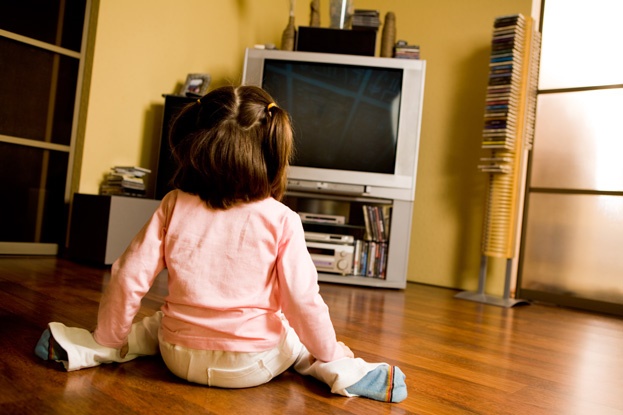
The more you object to TV watching, the more they protest and the more attractive the TV becomes. You are about to throw it out or capitulate!
Sheryl Cohen, an educational psychologist takes a closer look at Children and TV: what are the effects, how much is too much and what is your role as parents in setting appropriate limits.
It is naïve to think that TV has no impact on our children and our families. Our children are fast becoming part of a TV culture, which includes computers and cell-phones and other technology.
A more realistic question, therefore is what kind of impact does television have?
The greatest criticism of TV is that it is often punctuated with violence.
A study in America (by Tomlinson-Keasey), showed that physical aggression occurs between 10 and 20 times per hour on prime-time weekend viewing. They conclude that by the time the average child graduates from high school, he or she will have witnessed 13 000 violent deaths on TV. There is also evidence, which shows that when children watch aggression on TV they are more likely to behave aggressively. And this has been shown to be more apparent in pre-school children.
Another common criticism is that TV interferes with family communication.
Studies show that the more TV children watch, the less communication there is between family members. An American Study (from the University of Missouri) showed that on average, fathers spend 8 minutes talking to their children each day, working mothers spend on average 11 minutes and stay at home mothers spend less than 30 minutes communicating with their children each day.
But one does not know whether poor communication causes children to watch TV or whether TV causes poor communication. The significant point is, however, that children spend more time watching TV than communicating with their parents.
I have often watched children watching TV. They seem to be in a trance-like state, an altered state of consciousness. What becomes apparent is that they are in a state of deep relaxation. What is worrying is that they lose the capacity to filter out what is real and what is not, what is right and what is not. They loose the capacity to think. In this sense, therefore they become suggestible to whatever is being presented and this might not be in their best interests. Maybe being a good mother has more to it than buying a specific type of food or washing powder for your family.
So what is your role as parent? Here are some ideas:
1. Parents need to be both sensors and mediators!
This means that you have to sensor what is appropriate to watch on TV and what is not. You have to decide this for yourself and for your children. But this is not your only role. To mediate what children see is also important. This means that you can talk to your children about what they see. So if you are watching the cricket with your son and a streaker flies across the screen, this is not to say that you sensor all sport. This is an opportunity to learn from the experience. It’s an opportunity to talk to your children about the world.
2. Videos are far more appropriate for children.
Then parents can be sure about what children are watching.
3. Because TV is passive.
Balance it with active play.
4. Allow children to develop their auditory skills apart form their visual skills.
Listening to stories is a wonderful way for children to build their listening skills and their imagination. Have you ever read a book and then seen the movie? Sometimes the movie is so disappointing because you built the characters in your mind – and they are much more rich and exciting than the movie’s version. TV can diminish children’s capacity to imagine.
5. TV and videos can be used to stimulate play.
When Liam watches cricket he likes to go outside to play cricket. This is healthy, but a balance must be encouraged.
6. TV promotes instant gratification
Even wildlife videos do not reflect the reality of time. A baby calf is born and grows old in the same half-hour show. Balance it with slower activities such as planting a seed. Children need to know that there is a process to life, which unfolds, and that not all experiences are instantaneous.
There are other positives to the use of TV, computers or videos
- Videos or computers can be good babysitters. When you have to feed the baby and your toddler keeps disrupting the process, it is a relief to put on a video and have some peace and quiet for a while. This is appropriate. It supports you in order for you to support the children. Of course this is open to abuse and needs to be monitored.
- Samuel was starting his first day at primary school. He was very anxious. He was ready early in the morning and waiting to go. But the longer he waited the more anxious he became. His mom recommended that he watch some sport on TV. This gave him the opportunity to stop thinking for a bit, to take his mind off his worries. But this, of course, needs to be accompanied by acknowledging his feelings.
- Gina’s parents are divorced. When she comes home from her dad, her mom asks her “what did you do? Where did you go? Did you eat? Have your bathed?” Gina feels bombarded by questions. She needs some “transitional space”; some emotional time and space to help her with the transition form one home to another. TV is a nice way to do this! To give her some time before she adjusts to the demands of a different environment.
But how much is too much?
As much time as they watch is about the same amount of time children need to be read to. So if you can read to them for 4 hours then let them watch for 4 hours. Balance reading, playing and TV or computers so that children are getting what they need in a day. Clocks and timers can be used to help children monitor their own viewing. One family decided to let their son watch 30 minutes of TV a day, and that he could choose when to use his time. When this child turned on the TV he had to decide whether it was worth using his 30 minutes or not. He was using his discretion. This is an important life skill.
Do you think your kids watch too much TV? So how much do they watch per day and how old are they? What do they watch? Send your comments to chatback@parent24.com and we may publish it.




 Publications
Publications
 Partners
Partners










